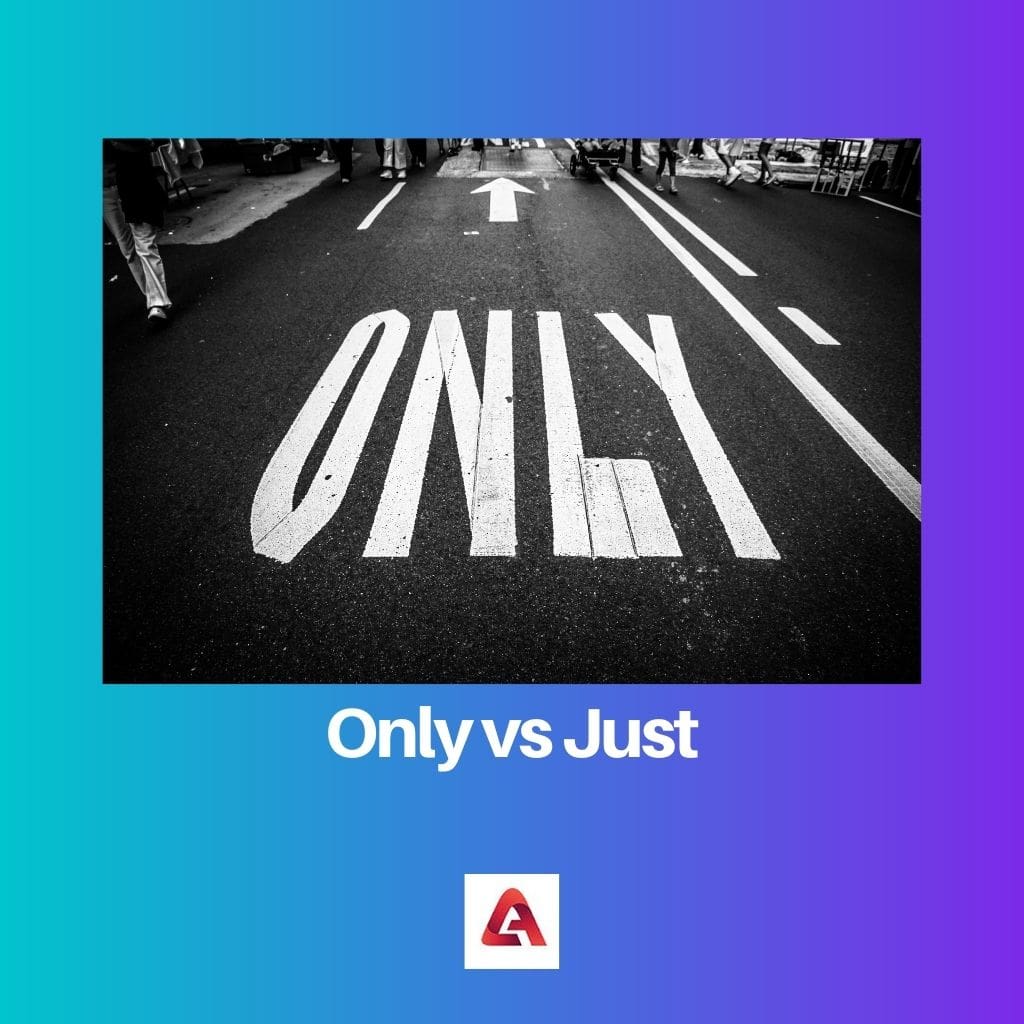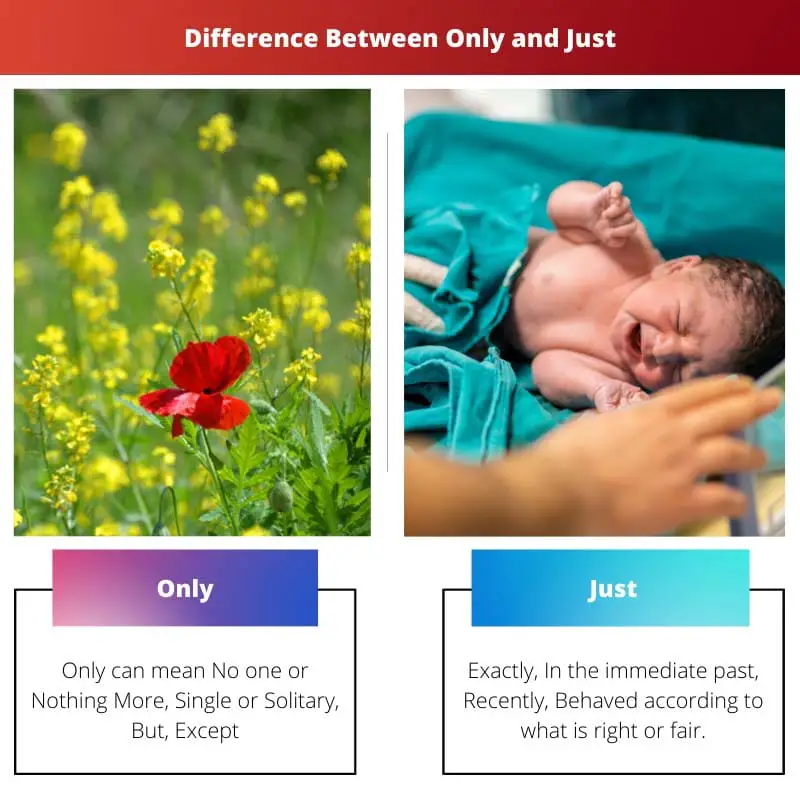“Only” emphasizes exclusivity or limitation, indicating that something is singular or unique in a particular context. For example, “She is the only person who can access the secure files.”
“Just” suggests a narrow scope or simplicity, implying adequacy or minimalism. For instance, “I’ll just have a small salad for lunch.”
Key Takeaways
- Emphasis on exclusivity: ‘Only’ emphasizes that something is restricted to one specific item, person, or situation.
- Limited to a specific amount or degree: ‘Just’ stress that something is no more than a certain amount or degree, implying that it is barely enough.
- Slight difference in tone: ‘Just’ can convey a sense of immediacy or urgency, while ‘only’ may have a more neutral or limiting tone.
Only vs. Just
“Only” emphasizes that something is limited or exclusive.”Only” can also restrict or limit an action. “Just” indicates that something is barely sufficient or narrowly applicable. “Just” can also be used to express fairness or impartiality.

Comparison Table
| Feature | Only | Just |
|---|---|---|
| Meaning | Exclusivity, singularity | Recentness, limited amount, fairness |
| Interchangeable | Often, but not always | No |
| Examples (meaning “only”) | * He only speaks French. * I only want water. | * I just want water (informal). |
| Examples (meaning “recently”) | * I just arrived. * It just happened. | |
| Examples (meaning “fairness”) | * It’s just not fair! * He was just following orders. | |
| Emphasis | Stronger emphasis on exclusivity | Weaker emphasis, can indicate informality |
| Formality | More formal | More informal |
What is “Only”?
“Only” is a versatile word in the English language that serves multiple functions across different contexts. Its usage can significantly impact the meaning of a sentence or statement. Here, we’ll delve into the various roles and nuances of “only.”
Limiting or Restrictive Meaning
One of the primary functions of “only” is to denote limitation or restriction. It specifies that something is exclusive or singular in nature, excluding all other possibilities or options.
Example:
- She is only five years old. (Indicates that the person mentioned is precisely five years old, not older or younger.)
Emphasizing Sole Criterion or Condition
“Only” can highlight a singular criterion or condition, emphasizing its significance in a given context.
Example:
- Only those with a valid ticket are allowed entry. (Emphasizes that possessing a valid ticket is the sole criterion for entry.)
Conveying Exclusivity or Uniqueness
“Only” is used to convey exclusivity or uniqueness, suggesting that something is the sole instance of its kind.
Example:
- This is the only copy of the manuscript. (Implies that there are no other copies of the manuscript.)
Denoting Merely or Just
In some contexts, “only” is used to convey a sense of minimalism or insignificance, indicating that something is merely or just as described.
Example:
- He’s only a beginner in chess. (Suggests that his skill level in chess is not advanced.)
Highlighting Surprising or Unexpected Situations
“Only” can be employed to highlight surprising or unexpected situations, used in expressions of disbelief or contrast.
Example:
- She’s only been working here for a month, but she already knows everything. (Highlights the surprising level of knowledge despite the short duration of employment.)
Placement and Ambiguity
The placement of “only” within a sentence can affect its meaning. Placing “only” before different elements of a sentence can lead to ambiguity or alter the intended interpretation.
Example:
- I only told him yesterday. (Implies that the action of telling was restricted to yesterday.)
- I told only him yesterday. (Suggests that among a group of people, only he was informed yesterday.)

What is “Just”?
In language and philosophy, the term “just” carries multiple layers of meaning, encompassing concepts of fairness, morality, equality, and correctness. Examining its nuances reveals its significance in various contexts.
Linguistic Perspective
From a linguistic standpoint, “just” primarily functions as an adverb or adjective, modifying verbs, adjectives, or other adverbs to indicate fairness, adequacy, or accuracy. For example:
- He just arrived. (indicating recentness)
- The decision was just. (denoting fairness)
- She is just as intelligent as he is. (highlighting equality)
Moral and Ethical Implications
In ethics and morality, “just” pertains to actions or decisions that align with principles of righteousness, equity, and moral correctness. Justice, a related concept, underscores the idea of fairness and impartiality in societal structures and individual behaviors. Discussions around justice delve into issues of distributive justice (fair allocation of resources), procedural justice (fair processes), and retributive justice (fair punishment for wrongdoing).
Legal Context
In legal discourse, “just” frequently appears in terms like “justice” and “justifiable,” emphasizing the law’s aim to uphold fairness and equity. Legal justice seeks to provide remedies for injustices, maintain order, and protect individual rights within a society’s framework of laws and regulations.
Philosophical Significance
Philosophically, “just” intertwines with broader inquiries into the nature of morality, ethics, and human conduct. Philosophers such as John Rawls have extensively explored the concept of justice, proposing theories like the “veil of ignorance” to determine fair principles for societal organization.
Social Justice
In social and political contexts, discussions of justice intersect with issues of social justice. This encompasses efforts to address systemic inequalities based on factors such as race, gender, socioeconomic status, and more. Movements advocating for social justice seek to rectify historical injustices and promote equality of opportunity and treatment for all individuals.

Main Differences Between Only and Just
Only:
- Used to indicate exclusivity or limitation.
- Often emphasizes a singular condition or circumstance.
- Can convey restriction or limitation.
- Can be used as an adverb, adjective, or conjunction.
- Examples: “She is the only one who knows the truth.” “I only have one dollar left.”
Just:
- Used to indicate a short time ago or a narrow timeframe.
- Often implies immediacy or recentness.
- Can suggest fairness or equality.
- Can be used as an adverb, adjective, or conjunction.
- Examples: “I just finished my homework.” “It’s just a suggestion, not a requirement.




